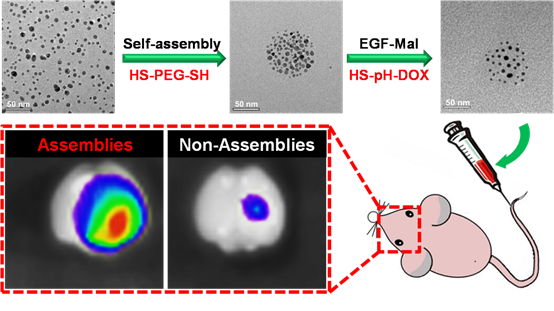Recently, Cheng Yu, Tongji University School of Medicine
Task Force in biologically responsive self-assembled nano-gold targeting brain
tumors made new progress, Related Research Posted in "Self-Assembly of
Gold Nanoparticles Shows Microenvironment-Mediated Dynamic Switching and
Enhanced Brain Tumor Targeting" in Internationally Prestigious Journals 《Theranostics》.
Task Force research assistant Feng Qiahuai is the first author of this paper,
Corresponding author Dongcheng Hospital Affiliated to Tongji University School
of Medicine Chengyu, Eastern Hospital, director of neurology Li Gang and
Northwestern University School of Medicine brain tumor director Maciej S.Lesnia.
Malignant
tumors of brain tumors are more common, with rapid development, treatment
difficulties, high mortality, the main reason is that the blood-brain barrier
limits the drug into the brain tumor tissue, it is difficult to achieve good
effect of chemotherapy. At present, researchers at home and abroad use
nanometer drug delivery system to improve the intra-brain delivery efficiency
of drugs. Nano gold clusters with biologically responsive self-assembly can not
only effectively penetrate the blood-brain barrier to increase the drug
enrichment in the brain tumor tissue area, but also accelerate the
biodegradation of the brain tumor in response to changes in the
micro-environment of the brain tumor, Reduce their own systemic toxicity.
Task
Group used advantage of HS-PEG-SH build Non-assemblies,<10
nm up Assemblies,~80 nm. The chemotherapeutic drug
Doxorubicin, which has a pH-sensitive modification, is loaded therein. The
results show that in the nude mouse brain tumor model, gold nanoclusters can
penetrate the blood-brain barrier and then enrich in the brain tumor tissue,
and its distribution in the normal brain tissue less. Among them, gold
nanoclusters in the brain is about 3 times the size of the smaller gold
nanoparticles, indicating that larger gold nanoclusters have better brain tumor
targeting ability. Animal blood half-life data show that gold nanoclusters
circulate longer in the blood than gold nanoparticles. After 24 hours of
intravenous injection, the blood concentration of gold nanoclusters returned to
the same level as that of gold nanoparticles, indicating that the gold
nanoclusters can be rapidly cleared by the body after being kept at a high
concentration for a period of time to avoid causing biological toxicity. In
addition, in vitro data revealed that gold nanoclusters have good glutathione
(GSH) response to high levels of tumor microenvironment and thus are more
conducive to the release of loaded drugs and their own degradation and
metabolism.
In
summary, the biologically responsive self-assembled nanostructured gold
nanoparticles have the advantages of simple preparation, high efficiency of
targeting, good safety and the like, which can be used as a carrier platform
for chemotherapeutic drugs to promote the enrichment of chemotherapeutic drugs
in brain tumor tissues, Improve the low bioavailability of chemotherapy drugs
defects, the future will help to improve the efficacy of targeted therapies for
brain tumors.
The
work won the support of the Ministry of Science and Technology, the National Natural Science Foundation of
China, the Shanghai Pujiang Talents Project, the Shanghai Cooperation Council
International Cooperation Project and the National Institutes of Health.

